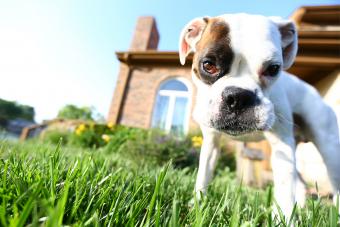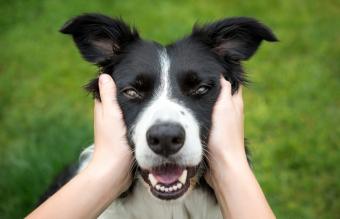
Love the look of a Boxer, but find a dog of that size too much to handle? A mini Boxer looks just like a regular Boxer, but is much smaller and is a good option if you don't mind that your dog is not purebred. They can be very playful, energetic, and bouncy at times similar to their larger counterpart, but they also love to relax and lounge around on their owner's lap, and they're a great size to do so!
What Are Miniature Boxers?
In truth, miniature Boxers are not actual downsized versions of purebred Boxers. They are simply another designer breed. The miniature Boxer was developed by combining a number of breeds to produce a Boxer-like canine that is significantly smaller than a purebred Boxer. However, keep in mind that they are most definitely not Boxers and are not recognized by any of the major kennel club registries with accepted breeding standards. Breeds used to create miniature Boxers include:
- Purebred Boxer x Boston Terrier, which is the mix most used to create the miniature Boxer
- Pug x Boston Terrier
- Pug x Rat Terrier
- Pug x Fox Terrier
- Corgi x Boxer
- English Bulldog x Boxer
- Beagle x Boxer
The resulting puppies from these combinations aren't uniform in size, but they are generally smaller than their purebred namesake and have a basic Boxer look.
Toy and Dwarf Boxers
Mini Boxers may be referred to as toy Boxers. There is no toy version of the purebred Boxer. Dwarf Boxers are purebred Boxers that suffer from dwarfism due to achondroplasia. These dogs fail to reach a full Boxer's height and weight because of their congenital condition. Their head and legs will also be disproportionate to their bodies and they may suffer from teeth and spine deformities.

Physical Characteristics
These dogs are around 25 to 55 pounds and 15 to 22 inches tall. Their height and weight will depend heavily on the breeds of their parents. They tend to have a short, hard coat and do shed, but not heavily. They can look like a smaller version of the Boxer, but again, this can depend on their parents.
Temperament
In general, mini Boxers have an outgoing temperament, and they make good family pets. However, they don't exactly display traditional Boxer temperaments because these dogs aren't purebred. If you want a puppy that has the most chance of inheriting the Boxer's buoyant personality, try to find one from a Boxer and Boston Terrier cross.
Personality of Boxers Mixed With Other Breeds
Pups produced from the various Pug, Terrier, Corgi, and Beagle crosses are also good-natured as a rule, but it can be difficult to predict which combination of the parent breeds' temperaments a given pup will inherit. If you're expecting a dog with a 100 percent Boxer temperament, you may be disappointed depending on how the offspring turn out.

Terrier Characteristics
Terrier personalities vary from one breed to another. Some are quiet and reserved, while others are loud and outgoing. Some love to play, while others prefer to lounge around the house. In general, they are known to be:
- High energy
- Strong-willed
- Playful
- Intelligent
Pug Characteristics
Pugs are extremely playful and love to interact with their owners. They also get along well with other animals, especially cats and other dogs. They're most known for:
- Friendly
- Good with children
- Easy going
Health Issues
Because these dogs have only been bred for a few years, there has been no study on whether there are any specific health issues being produced from these crosses. In order to get a better idea of which health problems a puppy might face, you must research the parent breeds involved, and take a look at health issues that are common to them. The average reported lifespan of these dogs is between 12 to 15 years.

- Boxers can be prone to cardiomyopathy, bloat, hip dysplasia, and hypothyroidism, among other possible health threats.
- Pugs can be prone to obesity, breathing problems, eye problems, and skin problems.
- Boston Terriers are prone to eye problems, heart problems, epilepsy, and skin problems.
- Fox Terriers can be prone to Legg-Calve-Perthes disease, patellar luxation, congenital hypothyroidism with goiter, and primary lens luxation, among other health issues.
- Rat Terriers can be prone to allergies, dental problems, and patellar luxation.
- Corgis are prone to eye problems, glaucoma, and progressive retinal atrophy.
- Beagles are prone to epilepsy, intervertebral disk disease, and tumbling puppy syndrome.
- English Bulldogs are prone to a long list of health concerns, including obesity, heat stroke, elongated soft palate, heart disease, and more.
Keep in mind that a particular pup might never face one of these health issues, but the possibility could be there in the gene pool, so it's good to be aware.
Pros and Cons of a Mini Boxer
Every dog breed and mix come with their pros and cons, and these are important to be aware of prior to bringing a breed into your household.
The breeding procedures used to create this mix are extremely controversial. Many " miniature " dogs have been heavily inbred, so it's not uncommon for them to develop genetic disorders or become ill at a young age, even from a reputable breeder. The miniature Boxer is also a high-energy breed that requires a hands-on owner. They aren't meant for owners with sedentary lifestyles or those who reside in apartments. Because the miniature Boxer sheds, it may not be suitable for those looking for a hypoallergenic dog breed.
If you understand the cons, there are many pros to this breed. Since they are smaller than Boxers, they are less expensive to feed and easier to care for. They require slightly less exercise than the original breed and can do well in smaller spaces, even if they aren't ideal apartment dogs. This mix is family-friendly, intelligent, eager to please, and easy to train. Also, they're relatively affordable to purchase as puppies.
Finding Miniature Boxer Puppies for Sale
When looking for a breeder of miniature Boxers, make sure you do your due diligence. Before you decide to do business, take the time to investigate the breeder fully to make sure you'll receive exactly what you're paying for. There are many unscrupulous breeders producing designer dogs, and you want to make sure the breeder can provide a health guarantee.
The breeder should demonstrate that they are breeding to create dogs with excellent health and temperament. Because these dogs are not recognized by the top registry organizations and are not bred in large numbers, you may have to search for them online as well as locally through sites such as Craigslist to see if you can locate a breeder.
Cost of a Miniature Boxer Puppy
Because these dogs are not popular yet, they can be relatively expensive. The average cost for a miniature Boxer puppy is between $450 and $2,000.
Dog Clubs
The miniature Boxer is not a recognized breed, but it may become one as some point in the future. If you'd like to register your pet with a dog club, both the American Canine Hybrid Club and the Certified Pet Registry take registrations for various crosses that produce this type of dog.
Spend Time With These Dogs
Before you bring one of these pups home, spend some time at several breeders' kennels so you can get to know the dogs in person. This is the surest way to find out if a Miniature Boxer will fit your lifestyle, as well as which particular cross you prefer. Getting a puppy is a commitment for the life of the dog, so be sure about your choice.







